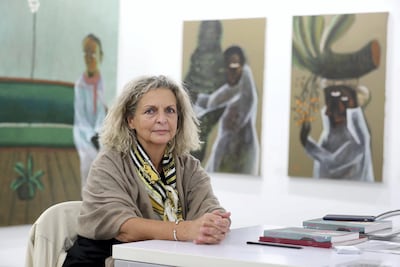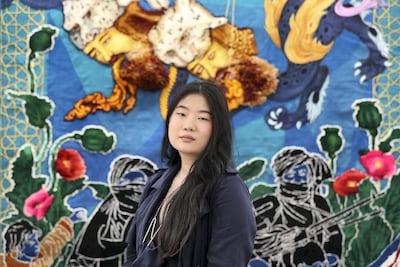Against the odds, Art Dubai kicked off on Monday.
The fair, now in its 14th year, was among the first to be disrupted by the Covid-19 pandemic in 2020. Art Basel Hong Kong cancelled its March event as coronavirus began to spread. Soon after, the team behind the annual Dubai event took its programming to the virtual realm, creating an online catalogue and hosting the annual Global Art Forum via livestream.
It seems things are coming full circle for organisers this year, however, as Art Dubai is now among the first to stage a physical art fair in 2021, although this has come with a few adjustments.
For starters, it has had to move from its usual home of Madinat Jumeirah to Dubai International Financial Centre (DIFC), where booths are housed in purpose-built tents under the Gate Avenue building. The number of participating galleries has also been reduced from the typical 90 galleries to 50. The smaller set-up does have its advantages, as we bypass the often dizzying experience of large fairs.
Another change is that this year’s booths have been divided up into three halls, with no obvious categories, unlike previous years’ curated sections. Stripped of the themes and expansive public programming, Art Dubai 2021 hones in on what it needs to do – sell art.
With the lockdowns and cancelled events of 2020, the art world has taken various measures to try and stay afloat. Many boosted their online marketing, joining art market platforms and revamping their own websites to keep collectors’ interest. Galleries at Art Dubai 2021 see the physical fair as an opportunity to make up for what the virtual world has not quite delivered – making connections with collectors.
Personal connections lead business
Circle Art Gallery from Nairobi, Kenya, for example, is participating in an in-person art fair for the first time since the pandemic started. Its booth features works by Sudanese artist Salah Elmur, whose retrospective was shown at Sharjah Art Museum in 2018 and whose paintings have been recently been acquired by Centre Pompidou, and Egyptian artist Souad Abdel Rasoul.
Danda Jaroljmek, the gallery’s director, says that despite boosting their online profiles and joining virtual fairs, the efforts have “not been hugely successful”.

"Our business is really based on personal connections," she told The National. "While we get enquiries from new networks, it's mostly the people we do know and built relationships with are the ones who come back."
Now, she is waiting to see if the international crowd will show up. “It’s only the beginning of day two, so it’s hard to tell what type of collectors are actually here, whether people have flown in,” she says.
Online sales expected to rise
Erica Kyung, a sales associate at Aicon Gallery, unlike Jaroljmek, expects that its sales will still take place online. She sees the fair as an opportunity for patrons, collectors, dealers and artists to meet and catch up, with those interactions becoming the focus of their attendance.
“While there are people coming and everyone is excited to see each other again, I think where the actual art acquiring comes from will be the online enquiries. Even with the physical component, we are seeing a shift for more serious enquiries online.”
Located in New York, Aicon has brought over works by a mix of established, mid-career and emerging artists such as Rasheed Araeen, Rachid Koraichi, Khadim Ali, Saba Qizilbash and Saad Qureshi.
'Masks are inhibiting'
For the Tropical Futures Institute, a gallery from the Philippines, the first day already brought in regional institutional interest, with one work by Kristoffer Ardena being sold. Gallery director Chris Fussner says the decision to come to Art Dubai was "nerve-racking", with the general cloud of uncertainty hanging over many events in the last year. "It was intense to say the least," he says.
While the hand-wringing over the opening is over, Fussner says the gallery still has to consider how it will manage fees and the artists when sales come in. The fair’s new payment structure, where organisers take a cut of the proceeds instead of the usual stand fee, has made it “a little easier to come in and participate”, says Fussner, though he still has to cross a certain threshold to make the venture worthwhile.
The gallery may be off to a good start, but he says Covid-19 guidelines are making it harder to establish connections. “The masks are inhibiting in terms of micro-expressions and communicating,” he says. The absence of social events this year – parties and private lounges were once staples of any fair – might also hinder chances to network, he adds.
Elodie Cassamajor, a consultant for Tafeta gallery in London, echoes the same sentiment. "With the masks, sometimes it's hard to understand what people are saying or make myself understood, but I think we have to get used to it," she says. Her gallery, which has experienced cancelled events in the past, namely The European Fine Art Fair (Tefaf) Maastricht in the Netherlands, which was shut down early in March 2020 because of a Covid-19 outbreak, is showing the works of Niyi Olagunju and Nkechi Ebubedike, and Babajide Olatunji, whose delicate hyper-realistic drawings are magnetic.
Tafeta – among others – are hoping that Art Dubai 2021 won’t meet the same fate as the Dutch event. There have been hiccups along the way, after all, including a delayed shipment that meant an artwork could not be not shown in time for the first day, something which seems to be a pattern, with many booths still welcoming artworks on the morning of the second day.
Nevertheless, Cassamajor is grateful the event has been able to go ahead. “We feel lucky to participate in a physical fair," she said. "The collectors need to see the works in person and to engage with the artwork in person. It’s not the same [as it was before], but we have tried to adapt and move forward."



























